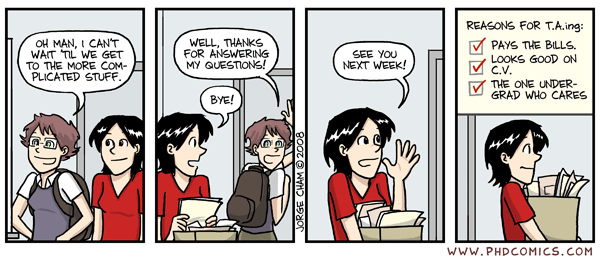A couple of weeks ago, I was asked by one of the new PhD students here at Dundee for tips on how to make the most of your first year. It gave me an idea for a post, which I haven't had time to write until now. I'll begin with a disclaimer that this is not likely to be the same as conventional advice you get in a handbook or textbook!
So, you're a new PhD student. First and foremost, congratulations! You've made it through a strict screening process (either by interview, funding application, degree results or a mixture of all three) and you're now on your way to earning the pinnacle of academic qualification - a doctorate. Yey! You're enthusiastic, maybe a bit nervous and wondering where on earth to start. Well worry not my friend, here's some advice from one PhD student to another on how to negiotiate that first year.
1. Become familiar with your surroundings
You might be doing your PhD at the university you did your undergraduate or masters at. It doesn't matter - the landscape as a PhD student is a world away from what you've experienced before. If you're lucky, you'll have an office, or at least a dedicated workspace. You might be teaching too. Get used to the building. You now have free access - those 'Staff Only' areas? They're for you now too! There's nothing worse than feeling like a teenager again getting lost on their first day of school. Take the time when no one's expecting too much of you to learn your way around.
.
Note that this includes things like: Where's the closest toilet to my office? Where is the nearest source of coffee? Where are the technicians and secretaries? Where is my supervisor's office? Is there a students-only room? Where is my lab space? Don't underestimate the importance of this knowledge!
2. A pretty office is a happy office is a productive office
I don't know you, but I'm sure you're lovely. Maybe you're a hardcore 9-5'er, maybe you view your studies in a more holistic sense or maybe you're a deadline adrenaline junkie. Whoever you are, I can guarantee you that a pretty office is a happy office. For example, this is my office:
Do you know what people say when they come into my office? They say "Oh my god it's so nice in here! I feel relaxed already! This is amazing! Will you come decorate my office?"
I'm not just trying to show off my office here (though it is lovely, isn't it?), my point is that having an environment where you feel relaxed and calm and happy does no end of good for your wellbeing and productivity. If your office is grey and bleak and you stare at a blank wall, you're not going to want to be there. Get creative with lamps, postcards, photos, whatever. Just make it your own and be happy :)
3. Bring the technicians and the secretaries cookies
In my School, we have one technician who is like the secret boss. He allocates offices, he'll help you if you fry your computer or desperately need new equipment and so on. The secretaries run this place. They know everything and are absolutely lovely, and know just the right person to talk to if you're having a problem.
Too many people are rude, abrupt or just generally inconsiderate of these staff members. Do you know what - break that trend and stop it right now. These people are wonderful and will probably be as much (if not more) help to you as your supervisor. Be nice, bring cookies or cake, show them how lovely you are.
4. Go forth and socialise
That's right, I'm giving you permission to go out there and drink or go for meals or spend your money. In all seriousness, I know there are a lot of new students who might be shy, in a new city and a bit overwhelmed, you might not have much money and don't know how to break the ice with the existing PhDs and post-docs who seem to have everything sorted.
I'll let you in on a secret: they have nothing sorted. I promise.
Getting to know your colleagues is one of the most valuable things you can do in your whole time at uni. Some of them might be in your lab so you might be going to conferences with them, having regular meetings with them or even collaborating with them in the future. Even if the others aren't in your lab though - these are the people who are going to keep you sane. They are the people who'll understand what it's like to simultaneously want to kill your PhD and love it. I can guarantee you that they'll get it much better than a partner, parent or sibling (unless they are also doing/have done a PhD).
These people will be your friends, your support network. And if you take the time to get to know them, when you graduate for the last time, you'll be leaving not just with a Dr title, but with some very close friends. Don't waste the opportunity.
5. Find out what events your School runs
In our department, we have a few things all students at postgraduate level and above, and all staff are free to attend. These include talks by invited speakers, workshops, internal seminars, postgraduate seminars, pub night (yes, pub night), and various parties. You should be able to get this information from your supervisor, or if not, try those helpful existing PhD students.
Think of this as an expansion on point four. These events are opportunities to get to know staff as well as students. Regardless of where you studied before, I imagine there was always a divide between you and the staff. Well, they still know more than you, but now they're happy to go for a drink or for coffee with you. Make friends. :)
6. Expect your question to change
If you started your PhD with a particular topic or question in your application, don't expect your final thesis to answer the same one. (This excludes any PhD students who signed up for a particular project; though your approach will probably evolve over the course of your PhD).
As you learn more, read more, do one experiment that goes horribly wrong, you'll find out what
really interests you. Answer that question instead. It'll make a better researcher out of you -
it happened to me.
7. WATCH YOUR MONEY!
If you are very lucky, you might be getting paid a stipend to do your PhD. For example, I'm on a School-funded studentship, for which I do teaching and/or marking, and in return the School pays my fees and gives me a stipend of £13k (tax free) for three years.
If you're anything like me, that sort of money is more than you've ever had in your entire life. Guess what? You're not suddenly rich! I was in a huge amount of debt from working in jobs that didn't even cover my outgoings, never mind food and so on, so I had a maxed out overdraft and two maxed out creditc cards. Now, I'm in a big amount of debt. I've got one credit card paid off, but I still have to be careful. It's so easy to go "YEEEEESSS!! MONEY!" and blow it all. I know you'll probably do this at least once, but just be careful, ok?

You can also make use of various benefits being a student has. If you live in the UK, students do not have to pay council tax. Get a letter from your Registry that confirms your student status and your start and finish dates, and take that to the council. They'll refund you anything you've paid, and you won't have to pay for the duration of your study. You're also eligible for a student account with most of the big banks. I had a student account with RBS as an undergraduate, which was converted to a graduate account when I finished. Now I'm a student again, it's back to a student account, and I'll get another two graduate years when I'm done. That means I'll have had 10 years of an interest free overdraft. Oh yeah.
Oh, and one other thing - you're now entitled, once again, to the holy grail that is student discount. USE IT.
8. When you start collecting papers, save them properly
Ok, so I know this seems quite minor, but trust me, very quickly you're going to have hundreds of PDFs. Currently, I have 354. Imagine how awful it'd be to navigate them if they were all saved 0459r5.pdf. I save each one by author name, publication year, and a couple of key words of what the paper's about.
You should also definitely consider getting
Dropbox. It's completely free, you can get extra space just by inviting friends, registering your uni email address, adding it to Twitter etc. It means your papers are all backed up so you shouldn't lose any. Mine are saved on Dropbox and a portable hard drive.
Look into reference management software like
Mendeley (which is free). You won't be responsible for killing lots of trees, and it even does your referencing for you! Score.
9. Do one big piece of work in your first year and aim to make it something publishable
Some schools will require you to do a piece of work in your first year as part of your conversion, which may be either an experimental report or a literature review. Either way, these are designed to be a draft for (at least) one chapter of your thesis.
Now, I don't want you to worry to much about it, but it is really a valuable thing to do. Start early, plan well and allow way more time than you think you'll need. It's only been by doing this that I finally feel confident in my own knowledge and abilities. Remember, it's not meant to be perfect. It's a tool to get you started on your career as a researcher.
10. STOP WORRYING. YOU ARE DOING FINE, I PROMISE.
If you're not already, there are going to be points during your PhD where you panic uncontrollably that you are not good enough, that you're going to fail, that you've somehow tricked everyone into thinking you're clever and that they're going to kick you out any minute.
Stop it. Right now.
It is
perfectly normal to feel this way. In fact, it's called
Imposter Syndrome.
I will promise you everything I own that every single PhD student has felt this way
at least once. Take a deep breath. Stop comparing yourself to other people. You are all brilliant. One guy might be drafting publications, one girl might have sh*tloads of data already. IT DOESN'T MATTER. You're all going to get there.
You can do this. If you're stressing out, go talk to your new friends, or your supervisor, your dog or your cat. Don't bottle it up. It's ok to worry, but don't let it get in the way - the fact that you're a new PhD student at all means that you've already got all the skills you need to complete the PhD. You just need to prove it to yourself.
Have faith. I know you've got this. Stop panicking. Go drink some beer with your new pals, eat some chocolate and enjoy the extra money. You've embarked on one of the best things you'll ever do in your whole life. I can honestly tell you I'm happier now that I've ever been. I have a really great group of friends, I'm challenged on a daily basis and I love it all, even the crap bits. Be open to the experience. Enjoy it. You're only going to get to do this once. (Unless you're a genius who's going to do two PhDs). Make the most of it.
Good luck!






















